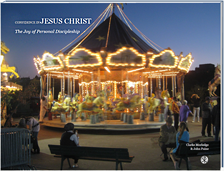
Dallas Willard. Pioneer for the renewal of spiritual formation in the contemporary church.
What is spiritual formation? Do we really need it?
Spiritual formation is a term that gets tossed around quite a bit in churches today, but there is a lot of confusion as to what it means. Some are even downright suspicious of the idea. This hesitancy is understandable. In the broader culture, we find a lot of appeals to so-called “spirituality.” There is spirituality in the workplace, spirituality Oprah-Winfrey-style to beat the rat-race, spirituality all over the place.
But as the late Dallas Willard observed, this type of generic approach to spiritual formation is misguided:
Human beings are, as such, supposed to have a spirituality. And in a sense they do. They remain spiritual beings, with all that implies. But on their own they’re dead spiritually. They’re cut off from the source of spiritual life. Yet what we are seeing and what we will continue to see is an attempt to take the merely human, dead in trespasses and sins, and make that into ‘spirituality’, framing it culturally, artistically, and in other ways (from the essay, Spiritual Formation: What it is, and How it is Done.)
In other words, spiritual formation without the Holy Spirit really does not lead to the type of life promised to the believer in Christ.
Earlier on Veracity, we briefly explored some of the basic ideas behind a Christian approach to spiritual formation. When we read Romans 12:1-2, we learn that the Apostle Paul urges us not to be conformed to the values of this world but instead to be transformed by the renewing of your mind. What does this mean and what does this look like in the daily life of the Christian? The answer to this question gets to heart of what genuine Christian spiritual formation is all about.
Here again, is Dallas Willard, from the same essay:
Spiritual formation in the tradition of Jesus Christ is the process of transformation of the inmost dimension of the human being, the heart, which is the same as the spirit or will. It is being formed (really, transformed) in such a way that its natural expression comes to be the deeds of Christ done in the power of Christ.
Transformation: As the Apostle Paul teaches in Romans 8:9-11, if Jesus Christ is in someone, then that person becomes spiritually alive. To be in Christ, through the indwelling of the Holy Spirit, means taking on the character of Christ (Galatians 4:19).
The problem is that many Christians are great at acquiring knowledge, but they are not so great about putting what they have learned into practice. On an intellectual level, we may be able to grasp the theology, but in terms of our day to day experience, our level of spirituality might actually be rather shallow. The challenge is this: practically speaking, what does it mean to take on the character of Christ in your life?
Here I want to try to address some of the misunderstandings Christians often have about spiritual formation. Like any misunderstandings of this sort, there are grains of truth that we should keep in mind.
Continue reading






